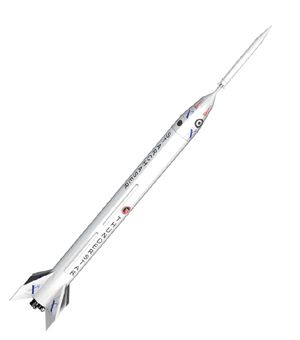| Construction Rating: | starstarstarstarstar_border |
| Flight Rating: | starstarstarstarstar_border |
| Overall Rating: | starstarstarstarstar_border |
| Diameter: | 1.64 inches |
| Manufacturer: | Estes  |
| Style: | Cluster, Scale |
 Brief:
Brief:
A fairly accurate single-staged scale representation of the Starchaser Industries' Thunderstar (their entry in the Ansari X-Prize competition) that uses a two-engine cluster like the real rocket was planned to.
Construction:
The rocket kit consisted of a white BT-60 body tube for the main airframe, a dual 18mm motor mount (consisting of two fairly thin centering rings, two 4" long motor mount tubes, two motor retainer hooks, two engine block rings, and two mylar retainer rings), a plastic nose cone, a laser-cut sheet of balsa fins, a mylar/paper launch lug, a yellow spacer tool tube, a 1/4" wide rubber band for the shock cord, a preassembled 18" plastic parachute, and a bag full of plastic detailing parts. All the parts were present in my kit. None were damaged though some of the longer thinner plastic detail parts had slight warps in them which disappeared when they were glued in place.
The instructions were typical Estes fare: well written and illustrated and in a fairly logical order. Plastic parts were not on molding sprues, they had been cut off at the factory. That was a courtesy I wish they hadn't done when it came to the tiny escape-tower nozzles because I kept dropping the fool things.
Only one minor "gotcha": the dual mount centering rings are prone to breaking in half at their outside edges. I filleted the area between the tubes heavily with Elmer's gel School Glue to prevent any ejection-gas leakage.
I used a 48" section of 3/4" x 3/4" aluminum angle for a straightedge to extend the wrap-around guide lines the length of the tube. This works as well as the old door frame as well as on tubes that wouldn't fit in the frame too.
I wasn't all that impressed with the laser-cut fins. They weren't any easier to work with than die-cut fins would have been. I attached them with CA then filleted with the Elmer's gel.
I added a 28" black shoelace to the end of the rubber band shock cord Estes provided--cheap insurance against denting the tube.
PROs: Nice plastic parts, good overall materials
CONs: Flimsy centering rings and typical short shock cord.
Finishing:
Finish for the balsa parts was two coats of Testor's Non-toxic Cement for plastic models to seal the grain. This was the first time to do this on a model rocket, but I do it all the time on static models and it gives a nice smooth finish with no sanding between coats. I painted the base coat white with Liquicolor Artists Acrylics. (It was too grungy a day to spray paint.) Then used model enamel from Testor's for the silver on the nose cone and black on the display base with its nozzles.It was a simple paint scheme that anybody with a few rockets in their fleet could do this one without any fuss. I wish the kit would have used waterslide decals instead, but that's just my personal preference.
It looks really great on my display shelf between my Aerotech Warthog and my CC Express with its expanded payload-section modification.
Construction Rating: 4 out of 5
Flight:
My flight testing was at the AARG launch at the Hutto Hippodrome in beautiful rural Central Texas. It needed eight squares of fireproof tissue as wadding for each of three flights. I loaded two Estes B4-4 motors for its maiden flight, since there wasn't any significant wind. I used the stock 18" parachute included in the kit. The club set me up on a multiple launcher powered by a 12-volt deep-cycle battery. I had a very nice straight flight, which was tracked to 575 feet (using the single theodolite triangulation method). Not bad for my first cluster bird in over fifteen years...
Second flight was two B6-4s. Once again, a very nice straight boost with ejection just after apogee, which was 700 feet at that point according to the guy with the calculator. A little more drift than I liked on this flight, I probably need to switch to a 12" chute for my next flight, since I'm going for broke with two C6-5s for that one.
Flight number three was with two C6-5s and a 12" chute to 890 feet! Not bad at all for a scale model.
Recovery:
The Thunderstar uses the folded paper Estes shock cord fastener and rubber band shock cord, to which I added a 28" black shoelace for cheap insurance against the notorious "Estes dent" effect caused by their too short shock cords. It went together well.
There was no damage and the recovery speed was about right. I used a 12" chute for my flight on C6-5s. It came down closer to the pad on that flight and almost too fast.
Flight Rating: 4 out of 5
Summary:
Main PROs: nice plastic detailing parts, well-planned use of a 2-motor cluster to represent a 2-motor prototype, headline-grabbing subject.
Only CON: flimsy centering rings on motor mount.
Overall Rating: 4 out of 5
Other Reviews
- Estes Thunderstar By Kyle James Yawn
This is a scale model of the Starchaser Industry's entry in the Ansari X-Prize. Just like the real Thunderstar, this model is a cluster kit. It has a two engine cluster mount that flies on 18mm motors. It's a beautiful scale model and a good first cluster rocket. The kit comes with the following parts: 2 18mm engine mount tubes 1 body tube 1 spacer tool for construction 2 mylar ...
 |
 |
Flights
 |
 |
Sponsored Ads
 |
 |












S.S. (April 19, 2006)